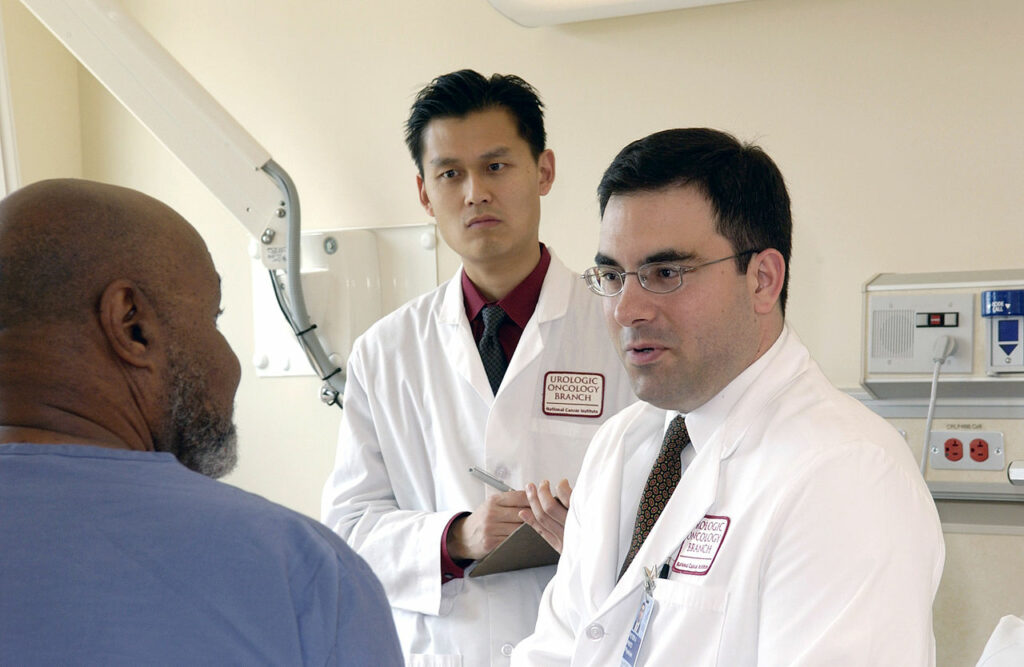A new study, published online in JAMA Internal Medicine, found that physicians have a poor understanding of risks and benefits of common treatments, tests, and screening procedures in every field they examined.
The researchers, Tammy C. Hoffman, PhD, and Chris Del Mar, MD, work at the Centre for Research in Evidence-Based Practice at Bond University in Australia. They set out to understand whether physicians had accurate knowledge of the risks and benefits of common treatments and procedures. In order to do so, they combined the data from 48 studies, including 13,011 clinicians. They found that in almost every situation, including psychopharmaceutical prescription, CT scans, and cancer screening, physicians tended to overestimate the benefits of treatment and screening, while minimizing the potential risk.
There was one exception to this rule: When asked about the risks to a pregnant mother, doctors tended to overestimate, rather than underestimate, the risks. This was true for both psychopharmaceutical use and for radiological tests.

Overall, the researchers found that most physicians were only able to correctly estimate potential harms of procedures 13% of the time (9 of the 69 outcomes), and correctly estimated the magnitude of potential benefits only 11% of the time (3 of the 28 outcomes). Participants were far more likely to underestimate harm (34%) rather than overestimate it (5%), and they were far more likely to overestimate benefits (32%) rather than underestimate them (9%).
Some of the individual studies included in the meta-analysis were worrisome on their own merits. For instance, a 2005 study that surveyed doctors regarding cancer screening tests concluded that “Physicians were unaware of screening test efficacy and risk.” Similarly, a 2003 study found that “Most GPs overestimated the accuracy of screening tests for prostate cancer.” Studies examining doctors’ understanding of cancer risk from radiology (such as CT scans) consistently found that knowledge of the risks was poor. In fact, a 2004 study concluded that “Many physicians in this sample had a lack of basic knowledge about radiation exposure.” In that study, the researchers found that doctors did not even utilize basic methods for protecting themselves from radiation exposure.
A previous study conducted by Drs. Hoffman and Del Mar examined patients’ estimations of risks and benefits and found that patients were even more ill-informed. This finding makes it imperative that physicians take steps to be informed enough to provide information to patients who may not understand the risks of the procedures they are asked to undergo.
In the field of psychiatry, researchers have increasingly called for clearer procedures for ensuring that patients are informed about the risks of pharmaceutical treatment. For instance, a 2012 article in the International Journal of Law and Psychiatry suggested that the dangers of antidepressant medications have been consistently obfuscated by the pharmaceutical industry, which has also exaggerated their potential benefits. Another study, published this year, found that “Claims that second-generation antipsychotic drugs have safety advantages over classical neuroleptic drugs and prevent relapse were not supported in these key studies” and suggested that the use of these medications should be reconsidered.
These results are concerning, and indicate that more research should be done to examine providers’ perceptions of risk and benefit for psychiatric and psychological treatments. The researchers suggest that training programs need to provide more clarity around the specific risks and benefits of common treatments, in order to more adequately prepare physicians for informed consent conversations.
****
Hoffman, T. C., & Del Mar, C. Clinicians’ expectations of the benefits and harms of treatments, screening, and tests: A systematic review. JAMA Intern Med. Published online January 9, 2017. doi: 10.1001/jamainternmed.2016.8254 (Abstract)















“… the dangers of antidepressant medications have been consistently obfuscated by the pharmaceutical industry, which has also exaggerated their potential benefits,” which has resulted in the medical community becoming deluded. And the American medical community is apparently not intelligent enough to read their DSM-IV-TR, which states quite clearly, “Manic-like episodes that are clearly caused by somatic antidepressant
treatment (e.g., medication, electroconvulsive therapy, light therapy) should not count toward a diagnosis of Bipolar I Disorder.”
And when the medical community makes such a misdiagnosis, which has occurred en-mass in the USA in recent decades, and tries to cure the adverse effects of an antidepressant by adding a “bipolar treatment,” adding an antipsychotic drug. The medical community is forgetting what they were taught in medical school about the stupidity of combining the antidepressants and antipsychotics:
“The symptoms of an anticholinergic toxidrome include … delirium, … hallucinations, … psychosis, … Substances that may cause this toxidrome include the four ‘anti’s of antihistamines, antipsychotics, antidepressants, and antiparkinsonian drugs[3] as well as atropine, benztropine, datura, and scopolamine.”
Doctors can’t tell the difference between psychosis caused by anticholinergic toxidrome and psychosis caused by any of the scientifically “invalid” DSM disorders, but they can only get paid if they misdiagnose anticholinergic toxidrome as one of the billable DSM disorders, since this psychiatric drug induced psychosis is not listed as a possible cause of psychosis in the DSM. Out of sight, out of mind, right, authors of the DSM? But it should be clear why the mainstream medical community thinks a psychiatric industry that recommends combining the antidepressants and antipsychotics is stupid. How long until the psychiatric industry changes their current “bipolar” drug cocktail recommendations, that currently encourage combining the antidepressants and antipsychotics?
“’Claims that second-generation antipsychotic drugs have safety advantages over classical neuroleptic drugs and prevent relapse were not supported in these key studies’ and suggested that the use of these medications should be reconsidered.” The antipsychotic drugs have historically been, and are still, “torture” drugs – remember the Russian dissidents, psychiatrists? The neuroleptics can also create the negative symptoms of “schizophrenia” via neuroleptic induced deficit syndrome. But absolutely, today’s psychiatric industry is completely delusional, and believes these “torture” drugs are “wonder drugs” that must be forced upon innocent others forever, largely so the psychiatrists can profiteer off of silencing child abuse victims, according to the recent medical evidence.
Report comment
Great article, more historical facts coming forth.
To: Someone Else; Thanks as always, for the points made with supporting facts of the many financially motivated actions taken by industry participants, due to “billable disorders”. Rather than informed professional behavior backed by evidence, many actions are brought about due to the policies that the goal is profit based to the organization & shareholders of employment.
Upton Sinclair too, comes to mind… ‘It is difficult to get a man to understand something, when his salary depends on his not understanding it.’
Sadly, some believe exploitation is profitable and beneficial.
Report comment
And it may not be a “common” intervention or “treatment”, but it is significant that Read and Bentall concluded that “…the risk-benefit analysis for ECT is so poor that its use cannot be scientifically justified” (because of permanent memory loss, risk of death, etc.). BUT doctors are still using ECT/TBI, citing it as the “gold standard” in treatment of severe depression and insisting it is “safe and effective” when research and patient/victim testimonies have shown otherwise.
Report comment
My suspicion is that psychiatrists are the worst about this. Many of them are not even good GP’s. It still boggles my mind that a person would waste all those years devoted to becoming a doctor and then choose to become a psychiatrists! I just don’t understand it at all.
Report comment
I am shocked by this news! Who knew that medical personnel tried to sell interventions just so they can make a profit?
DUH!
Report comment
Yes, to-the-choir preaching, this one, almost comically so. But it was nice to see someone put the blasted 2nd Gen antipsychotics in their place. Abilify caused akathisia in 25% of subjects in the trials that led to its misguided approval by the FDA as an adjunct to an antidepressant when the antidepressant has damaged the brain so much that its effects can no longer take place in what is left. Basically, you stay on an AD long enough and you’ll need an AP. What does that imply?
Why don’t they take the poor sucker off the antidepressant, then? Because they can’t. Ever seen a plank that’s been eaten by termites? They leave the outermost layer of the wood intact. Its looks fine, but if you poke it, you break right through the unsupported veneer and discover a bustling community of insects taking up the space. The wood is our brains and the termites are the drugs. They’ve done the harm and now they occupy the tunnels they created in the process. It’s best to leave things as they are.
So what is Abilify? A gallon of shellac poured over the scene of the destruction, holding it together from the outside.
Report comment
Gee just think! According to “modern” psychiatry, it is better for your physical pain to be in physical pain because pain medications are to dangerous! On the other hand, here is an antidepressant for the depression you are in because of the pain! Yes we are MAD IN AMERICA and psychiatry has only themselves to blame! In the effort to “control’ and guide people into the crap you are selling, your use as a viable option for psychiatric care is not viable! GOOD JOB! My Arthritis is now a psychiatric problem! Let me tell you this “Psychiatrists”! You are slowly making yourselves a hindrance to well-being, not an answer! It will be nice when stress is just stress! Not http://www.welfare.ie/en/downloads/protocol3.pdf
Report comment